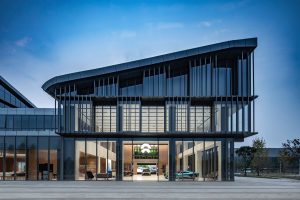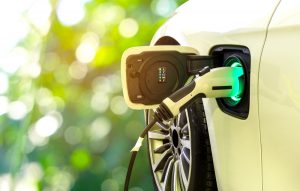China’s electric vehicle (EV) market is the world’s largest, just like its overall automobile sector. With over 1.7 million electric plug-in vehicles sold in China in 2019, US-based EV leader Tesla (NASDAQ:TSLA) views the country as strategically vital to its global ambitions.
Following the establishment of its Gigafactory in Shanghai in 2019, Tesla has made serious inroads in China’s overcrowded EV sector, producing the best-selling EV in China. It sold 68,579 units of the Model 3 as of August, according to a report by Caixin Global that cites the China Passenger Car Association.
Tesla’s leading position in EV and battery production is a prime example of the sophisticated manufacturing processes emphasized in China’s national directive to develop new infrastructure. The complexities of designing and mass-producing industry-leading electric vehicles, complete with intelligent software solutions, form an excellent barometer for the strength of a nation’s tech-driven manufacturing competency.
Over 480 domestic EV companies were registered in China as of March 2019, but as Tesla’s entrance has raised industry standards, a few domestic champions have emerged as leaders in the hyper-competitive sector, including Nio (NYSE: NIO), Li Auto (NASDAQ: LI), and Xpeng Motors (NYSE: XPEV).
Tesla’s Chinese competitors have publicly professed an amicable position towards the company in light of Tesla’s plans to released a Model 3 in China that retails at a competitive price of around USD 25,000. Tesla’s soaring stock price since the start of 2020 has boosted valuations for peer EV startups seeking initial public offerings (IPOs).
Just as Apple (NASDAQ: AAPL) paved the way for many of today’s Chinese smartphone giants, both in terms of design and business model, Tesla provides the archetype for EV startups in its holistic approach to the EV market, which includes proprietary charging infrastructure, energy storage, and sales channels, in addition to vehicles.
Unconventional sales models
Tesla’s control over its own sales channels means that it does not have to rely on dealerships to facilitate sales. Some rivals have taken notice and are building up their own networks to buoy turnover and optimize customers’ purchase experience.
For example, Xpeng Motors’ physical sales and service network consisted of 147 stores and service centers, which cover 52 major cities in China as of June 30, 2020. For comparison, Tesla has just 28 stores in China covering 13 major cities.
For EV startups, significant capital is required to make waves in the space, evidenced by Chinese firms’ large and frequent fundraising. A full ecosystem approach only adds to those costs. Despite the added financial pressure, Tesla’s local competitors in China are leveraging their own sales channels to augment the brand.
Shanghai-based Nio has also chosen to forgo the traditional franchise dealership model for a direct-sales method combining the company’s offline and online sales channels, a strategy which the company admits in its IPO prospectus may slow the rate of its expansion. So far, the firm’s physical footprint includes 22 Nio Houses and 119 Nio Spaces, its two types of salesrooms, in 89 cities across China.

Nio Houses are comfortable, luxurious physical locations that aim to elevate Nio to more than a car company, but more of a lifestyle brand. In addition to serving as a showroom and service center, each Nio House has a members’ area with access to a café, meeting rooms, a library, a children’s play area known as the “joy camp,” and a “forum” space for events and exhibitions.
In contrast, Nio Spaces, launched in mid-2019, are smaller and focus on customer engagement with cars. They usually cover less than 200 meters in area, most of which is a showroom, with an average construction cost of below RMB 1 million (USD 148,200). Nio Spaces are primarily meant for customers outside of China’s top-tier cities, where there are fewer Nio Houses.
Beijing-based Li Auto also uses a blended direct-sales model to engage customers both offline and online, forgoing the dealership strategy used by conventional automakers. It seems that when it comes to owning the means of distribution, China’s leading EV startups are taking a page from Tesla’s book.
Read more: Meet ‘China’s Elon Musk’ Li Xiang, founder of Li Auto

Part of Tesla’s allure is its sleek design style, which has endowed the brand with a combined feeling of innovation and exclusivity. Its inspiring and consuming products have led to some likening avid Tesla fans to members of a cult, a devotion to the brand that Chinese EV startups naturally crave.
By controlling the sales channels, these EV companies aim to augment the entire purchase experience for the customer. Instead of being just another brand on the lot that is peddled by third-party dealerships, Chinese EV players want to make a lasting impression that inspires potential buyers to become lifelong customers. In addition, these next-generation vehicles also offer greater customizability than their traditional peers, enabled by advances in internet-of-vehicles technology, further enhancing the consumer experience.
Supercharging the brand?
When it comes to charging infrastructure, however, domestic rivals are split over whether to follow Tesla’s lead.
Despite currently relying on a network of over 200,000 third-party charging piles, Xpeng still aims to invest more in its own branded charging infrastructure. The company stated in its IPO prospectus, “We believe an extensive Xpeng branded supercharging network will enhance our brand recognition and provide differentiated user experience to our customers.”
Nio, who like Tesla also gets its batteries from CATL (SZ:300750), has made no indication that the company aims to develop its own proprietary charging infrastructure. However, the firm is getting ready to launch a battery-as-a-service business model in the third quarter of the year. According to Nio’s chairman William Li, the company will begin selling cars without batteries, and will lease the batteries to customers through a separate company. The move could lower the cost of Nio’s vehicles by around 40% (with separate payments for battery rental fees), keeping them within the price range for government subsidies, which are offered for passenger cars that cost less than RMB 300,000, or USD 44,400.
Shanghai-made Tesla Model 3s are also cheaper now. Its basic option is marked at RMB 249,900, or just over USD 37,000.
Watch this: Will battery-as-a-service give Nio a competitive edge?

As electric vehicles become more mainstream in China, the country’s charging infrastructure is straining to keep up and remains a bottleneck for the entire industry, as pointed out by Li Auto in its IPO prospectus, specifically stating that “China faces a problem of inadequate private and public fast-charging infrastructure.”
The company cited a CIC report explaining that the charging issue in China is further exacerbated by the lack of available space for home-charging, as fewer than 25% of families in first-tier cities had parking space suitable for installing home charging stalls, compared to over 70% of families in the United States.
In fact, Li Auto’s Li Xiang One vehicle is actually a hybrid that can also run on a 45-liter gasoline tank should the car’s battery be drained. With the company relying on hybrid cars as opposed to entirely electric vehicles, there is little incentive for Li Auto to create its own charging infrastructure.
More than just cars
Tesla’s ambitions extend beyond its vehicles in the form of Tesla Energy. Elon Musk believes the California-headquartered EV leader’s battery business will grow even faster than its pace-setting automotive operations.
After the company’s Battery Day in September, Musk was disappointed with much of the coverage, expressing his view that many industry observers lacked an appreciation for manufacturing.
China’s EV champions have built their high-tech production facilities on the back of the Chinese economy’s accumulated expertise in industrial manufacturing. So why have they not followed Tesla’s lead in power storage and batteries?
The reality is that even Tesla Energy has endured challenges along the way. The business has sapped financial and engineering resources from the company, including a controversial acquisition of SolarCity in 2016, which prompted a lawsuit from the company’s shareholders.
It might not make financial sense for Chinese EV players to cultivate proprietary energy storage solutions. Such products are unlikely to generate the high profits required to justify the significant capital outlay that is needed. China’s current policies on energy storage have further squeezed the products’ margins, hampering the industry’s development.
As a result, domestic EV startups are likely to avoid branching out like Tesla has. Instead, energy storage in China may be left to public utility operators, as there is not enough available profit in the current environment.

